Accused Assassins Lead Bolivia to Target Enemies
Ragtag Group of Europeans, Killed by Government Forces in Bizarre Raid, Are Spur for Rule Allowing Seizures of Suspects' Land
May 23, 2009 - Wall Street Journal
By ANTONIO REGALADO, AARON O. PATRICK and MARGIT FEHER
SANTA CRUZ DE LA SIERRA, Bolivia -- The investigation into an alleged assassination plot against Bolivia's president Evo Morales has helped give the leftist leader a new target: the property of key political enemies.
In April, Bolivian security forces raided a hotel here and a killed a Hungarian-Bolivian poet and actor, Eduardo Rózsa Flores, and two alleged accomplices: 24-year-old Irishman Michael Dwyer and Árpád Magyarosi, a 28-year-old Romanian. Mr. Morales says the men were plotting to kill him.
The shootout capped a strange misadventure in which Mr. Rózsa recruited a ragtag group to defend the separatist province of Santa Cruz against a feared attack by the Morales government. During several months in Bolivia before the deadly raid, Mr. Rózsa talked of forming an antigovernment militia, and his crew took snapshots of each other brandishing weapons.
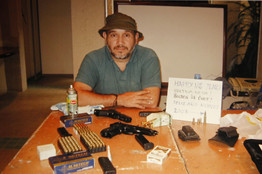 (right) In undated photos provided by Bolivian officials, Hungarian-Bolivian Eduardo Rózsa Flores poses with guns and ammunition in an unknown location. Photo: Associated Press
(right) In undated photos provided by Bolivian officials, Hungarian-Bolivian Eduardo Rózsa Flores poses with guns and ammunition in an unknown location. Photo: Associated Press
But they also posed as a film crew, partied and stayed at a series of high-end hotels. The Irish and Hungarian governments have questioned the killings and complained the case remains wrapped in mystery.
Regardless, Mr. Morales is citing the incident to act against his enemies. His ministers on Wednesday approved an antisedition decree allowing the government to seize the property of suspects in terrorism cases. Mr. Morales's government has been threatening to take over key Santa Cruz institutions, including its cooperative phone company, which have helped to finance political campaigns opposing Mr. Morales.
According to Bolivia's government, prime targets of the decree include Mr. Morales's main opponents in Santa Cruz, including its governor, as well as soy-oil baron Branko Marinkovic, a key financier of that state's vigorous movement for political autonomy. The Morales government says Mr. Marinkovic aided the Rósza gang with money and houses. Mr. Marinkovic and the governor, Ruben Costas, both say they have no connection to the Rósza group and that the accusation are aimed at neutralizing Mr. Morales' opponents.
Government officials acknowledged the focus on Santa Cruz. "It's three, four, five or six people at whom the decree is aimed," said Bolivia's Vice President Alvaro Garcia Linera on Thursday. "But it's also been promulgated to set a historical precedent, so that nobody else dares to divide Bolivia." Cesar Navarro, a congressman from Mr. Morales's party who is heading an investigative committee, said however that the sedition measure targets "traitors of peace," not any political party.
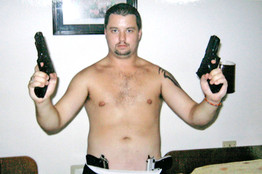 (right) Michael Dwyer, whom Mr. Rósza recruited to Bolivia, poses with weapons. Photo: Reuters
(right) Michael Dwyer, whom Mr. Rósza recruited to Bolivia, poses with weapons. Photo: Reuters
The government's moves stem from a puzzle centering on the murky movements and intentions of Mr. Rózsa, the Bolivian-born Hungarian journalist, poet and self-proclaimed fascist at the center of the alleged plot against Mr. Morales, and who spent the two years leading up to his death mounting a campaign to save his native Bolivia from socialism.
Mr. Rózsa was born in Santa Cruz and raised Catholic, but his life careened through countries and causes. His Jewish Hungarian father, a communist, fled Bolivia after a 1971 right-wing coup. Mr. Rósza wound up in Hungary, became a journalist, and eventually gained fame by fighting in Yugoslavia's civil war, an experience he turned into a Hungarian film in which he starred.
Over time, Mr. Rózsa's political passions veered hard to the right. He wrote on the Web that he was a fighter for nationalist causes and therefore a "fascist." One Hungarian journalist dubbed him a "right-wing Che Guevara."
In 2007, opposing Bolivia's Mr. Morales became his latest cause. He chose an unusual place to launch his crusade: a Web site devoted to the cause of Transylvanian autonomy from Romania. "Attention! To everyone!" Mr. Rózsa wrote on the site, Szekely Legion, in mid-2007. "Let's stop the white-hating national-socialist Indians."
In a Hungarian TV interview released after his death, Mr. Rózsa said that important figures in Santa Cruz had invited him home to start a militia to defend the province. In Web postings, he called Mr. Morales a racist seeking to wipe out Bolivia's mixed-race and white populations.
"More than anything he wanted to be a patriot for Santa Cruz," says Laszlo Hege, a filmmaker who was working with Mr. Rózsa on a new movie about his Yugoslav war days. Santa Cruz is a relatively prosperous area, where Mr. Morales's moves toward socialism aren't popular.
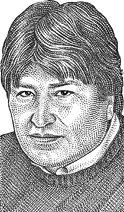 (left) Evo Morales
(left) Evo Morales
The president's support comes largely from the heavily indigenous Andean highlands; in the lowlands, such as Santa Cruz, the population is primarily mixed-race and white. The political opposition dominates and has waged a vigorous campaign for autonomy, which last year sparked violent riots.
Mr. Rózsa fished for militiamen in some unlikely places. One was Szekely Legion, a Web site that promotes the cause of Transylvanians still resentful over a World War I-era deal that made them part of Romania instead of Hungary. The Web site published Mr. Rózsa's rants against the Bolivian government and against financier George Soros, whom Mr. Rozsa called a "Jewish speculator" in support of Mr. Morales.
George Vickers, director of international operations for Mr. Soros's Open Society Institute, a New York-based nonprofit, says the "conspiratorial" theories about the Hungarian financier supporting Mr. Morales are untrue. He says Mr. Rózsa's "chain of reasoning is so bizarre that it's hard to follow."
The Web site's owner, 32-year-old Tibor Révész, declined to comment. Bolivia's government says Mr. Révész was among several additional foreigners involved in Mr. Rózsa's militia, and is seeking to question him.
In Ireland, Mr. Révész worked as a guard at a pipeline project, according to one friend and one co-worker. It was the same place where Michael Dwyer, the young Irishman, worked. Integrated Risk Management Services Ltd., contractor for security at the pipeline, said Mr. Dwyer was a security guard for six months last year. The company didn't respond to an email asking about Mr. Révész's employment.
Mr. Dwyer left Ireland in November, telling his parents he was going overseas on a bodyguard course with 15 other students, according to an interview his parents gave Irish TV network RTE.
Two Transylvanians, who had been living in Ireland, also headed off to Bolivia: Mr. Magyarosi, who liked to sing sentimental ballads, and his childhood friend, Elod Tóasó, who designed Web pages. Mr. Tóasó, arrested by Bolivian police and now in prison, later told Hungarian authorities he thought he had been hired to work on a movie.
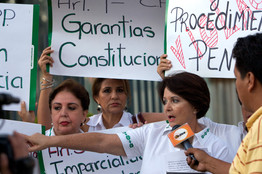 (left) A television reporter speaks in front of the Hotel Americas where the shootout happened. Photo: Noah Friedman-Rudovsky
(left) A television reporter speaks in front of the Hotel Americas where the shootout happened. Photo: Noah Friedman-Rudovsky
In Bolivia, the men rotated through three- and four-star hotels and openly roamed Santa Cruz. Mr. Rózsa, who went by the nickname "Chico," interviewed an ex-Army colonel who claimed to have hunted down Mr. Guevara, the revolutionary, in 1967. Mr. Rósza filed a story about it to a Hungarian Web site.
On social-networking sites, Mr. Dwyer quoted the heist movie "Heat" -- "Don't get involved in something that you can't walk out on in 30 seconds flat," he wrote -- and bragged about "cruisin in my new BMW in South America."
People Mr. Dwyer befriended in Bolivia, among them Diego Aramayo Siles, say he didn't come across as a tough guy, nor did he have a sports car. But he was also vague about his reasons for being in Bolivia. "He never gave a clear answer about that," says Mr. Aramayo.
At around 4 a.m. on April 16, police burst into a hotel where the men were staying. The commandos shot dead Messrs. Rózsa, Magyarosi and Dwyer. Mr. Morales says the police were "greeted with gunfire." Photos of the dead bodies, published in newspapers in Bolivia, show the men nude or in their underwear.
The incident prompted suspicion in Bolivia and abroad. In Ireland, a spokesman for Mr. Dwyer's family says he had no political leanings as a young man. "Cars and women are his passion," said a friend, Ronan Fox, at Mr. Dwyer's funeral in County Tipperary last month. In an email, another friend, Marcus Curran, said there was "not a chance" Mr. Dwyer would get involved in an assassination plot.
Mr. Morales, who has long complained that "oligarchs" in Santa Cruz were plotting a new right-wing coup, has made clear he thinks Mr. Rózsa's team represented a major threat. He sent army troops to Santa Cruz, and the government has released a list of leading opposition politicians it claims financed and aided the group.
While no charges have been brought against prominent figures, investigators have steadily leaked evidence they say implicates Mr. Marinkovic and others of aiding the group. The evidence comes primarily from the gang's Bolivian chauffeur, now under police custody in La Paz, the government says.
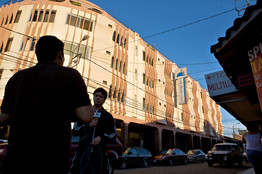 (left) Santa Cruz separatists protest the killings of the men in Santa Cruz by security forces. Photo: Noah Friedman-Rudovsky
(left) Santa Cruz separatists protest the killings of the men in Santa Cruz by security forces. Photo: Noah Friedman-Rudovsky
"The whole thing makes no sense," says Mr. Marinkovic, a Santa Cruz businessman and civic leader now accused by the government of ponying up $200,000 in financing, who has not been formally charged. He says he didn't know Mr. Rózsa, and believes the whole episode was a government sting operation.
The Bolivian government also produced 58 pictures the men took of themselves posing with pistols, brass knuckles, and high-caliber weapons. And it revealed a shaky video showing Mr. Rózsa, in which he calls the situation in Bolivia "worse than Yugoslavia" and, the government says, complains about a missed opportunity to blow up Mr. Morales during a cruise on Lake Titicaca.
Santa Cruz Gov. Ruben Costas, who has also denied accusations he met with the gang, said the plot is being used to influence presidential elections set for December. Mr. Morales "doesn't yet have the election won" and is attempting to "terrorize and scare off challengers in order to play the game alone," Mr. Costas said in a statement on Thursday.
The Santa Cruz phone cooperative, subject of a campaign to nationalize it, declined to comment. A consultant to the company, Luis Alberto Hurtado Vaca, was accused by the government of having paid hotel bills for the Rósza gang. Mr. Hurtado, who has disappeared according to authorities, was put on leave by the phone cooperative in May.